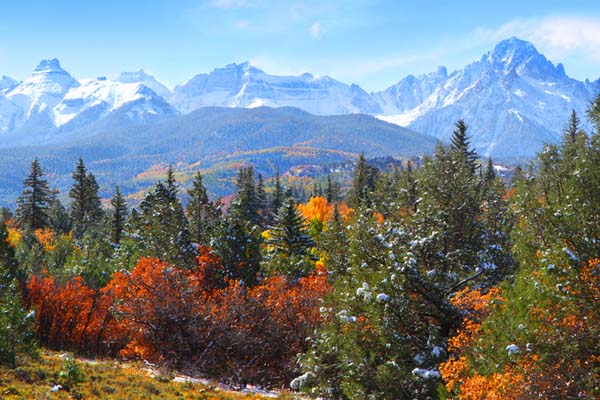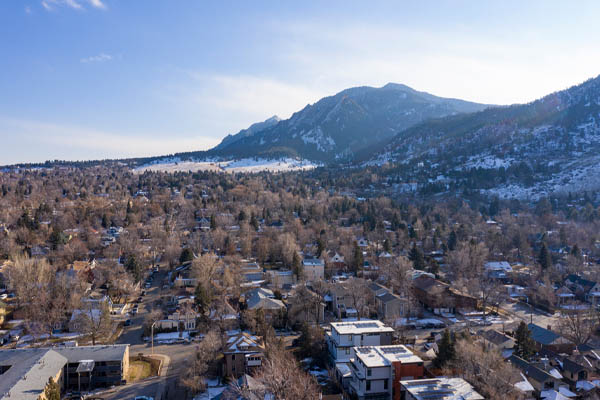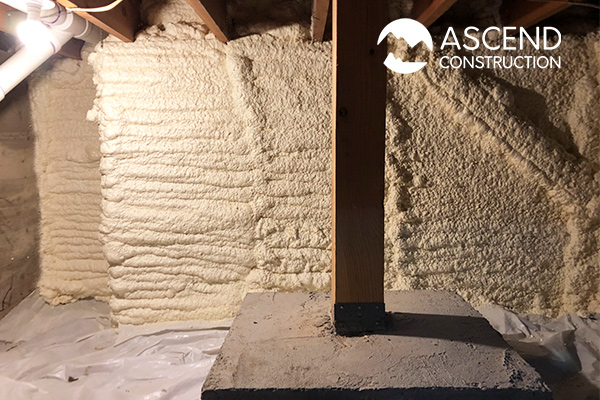Altitude Adjustments: How Elevation Impacts Your Insulation Choices in Colorado

Nestled amidst the diverse topography of Colorado, the interplay between elevation and insulation choices becomes pivotal. The state’s unique geographical and climatic conditions create a complex backdrop. It demands specialized knowledge in energy conservation. So how does altitude affect insulation?
Colorado’s wide range of elevations means insulation must cater to more than just thermal resistance; it must be a bulwark against the mercurial mountain climate. Here, selecting the appropriate insulation is a critical decision that goes beyond the conventional, ensuring homes are not only comfortable but also energy efficient.
Understanding the Science: Altitude and its Impact on Temperature and Pressure
Contents
- Understanding the Science: Altitude and its Impact on Temperature and Pressure
- Tailoring Insulation Choices for Colorado’s Varied Altitudes
- Frequently Asked Questions (FAQs) on Altitude and Insulation
- Why does altitude affect insulation requirements?
- Do I need different insulation for my basement vs. my attic in high-altitude areas?
- Are there insulation materials that are specifically designed for high altitudes?
- How often should I inspect or replace my insulation in elevated regions?
- Does altitude affect the cost of insulating my home?
- Is there a noticeable difference in energy bills when insulating correctly for altitude?
- How does altitude affect moisture and insulation?
- Can I use the same insulation materials in Colorado’s plains as in the mountains?
- Conclusion
- Call Ascend Construction For Expert Insulation Services
In the varied elevations of Colorado, the right insulation is critical for energy efficiency and comfort due to the unique impact of altitude on temperature and pressure. Here, we examine the scientific nuances that inform insulation choices in high-altitude environments:
Temperature Variations with Altitude

- Decreased Temperature: As elevation increases, typically, the temperature drops. Colorado’s varied landscape means that insulation needs can significantly change even within short distances.
- Altitudinal Zones: Specific temperature ranges are associated with different altitudinal zones—alpine zones (above 11,000 feet) experience much cooler temperatures than lower foothill areas.
Atmospheric Pressure and Altitude
- Decreased Air Pressure: With rising altitude, air pressure diminishes. This reduces the air’s ability to hold heat.
- Heat Retention: Insulation must be more efficient at higher elevations to combat the challenges posed by decreased air pressure on heat retention.
How Altitude Affects Insulation Performance
- Thermal Conductivity at High Altitudes: Thinner air at higher elevations impacts heat transfer rates, necessitating insulation that effectively mitigates temperature fluctuations despite the reduced air density.
- Impact of Lower Oxygen Levels on Insulation Materials: Materials prone to oxidation may degrade faster at higher altitudes; selecting oxidation-resistant insulation is crucial for maintaining its integrity and longevity.
- Insulation’s Response to Increased UV Radiation at Higher Elevations: Insulation must withstand more intense UV radiation, requiring materials that are specifically designed to resist UV-related degradation to ensure sustained performance.
Tailoring Insulation Choices for Colorado’s Varied Altitudes
Colorado’s diverse landscape calls for a tailored approach to insulation, varying significantly with altitude. The state’s unique topography, from the Eastern Plains to the Rocky Mountains, demands specific insulation strategies to ensure comfort and energy efficiency.
Low Elevation Insulation Needs
- Denver and the Eastern Plains: In these areas, where elevation is lower and temperature extremes are less pronounced, insulation needs attention on combating the intensity of both summer heat and winter cold.
- Recommended Materials and R-values: Standard insulation materials like fiberglass and cellulose are common, with recommended R-values ranging from R-38 to R-49 in attics and R-13 to R-15 in wall systems to comply with the local energy codes and optimize energy usage.
Mid Elevation Insulation Challenges
- Transitional Climates of the Foothills: These regions experience more variability in climate, necessitating a versatile insulation approach.
- Best Insulation Choices: Materials that offer a higher R-value per inch, such as spray foam, can be more effective, providing both temperature insulation and air sealing properties.
High Elevation Insulation Solutions
- Extreme Conditions of Areas like the Rocky Mountains: The high altitudes bring about more rigorous demands for insulation due to cooler temperatures and higher UV exposure.
- Top Insulation Materials and Techniques: Rigid foam or polyiso insulation is often recommended for its high R-value and resistance to UV degradation. Higher R-value systems exceeding R-49 in attics and R-21 in walls are advised, along with meticulous sealing to prevent heat loss.
For each elevation, a comprehensive energy audit can help pinpoint the best insulation approach, taking into account local climate, building codes, and the unique environmental stressors of Colorado’s varied altitudes.
The Role of Professional Assessment

In Colorado’s diverse climate, professional insulation assessments by Ascend Construction are vital. Our experts offer tailored solutions, determining precise R-values and recommending durable materials for your specific altitude needs. This expert guidance ensures your insulation meets energy codes. We also optimize comfort and efficiency against the unique climatic stressors of Colorado.
Frequently Asked Questions (FAQs) on Altitude and Insulation

Why does altitude affect insulation requirements?
Altitude impacts insulation requirements due to the relationship between elevation, temperature, and atmospheric pressure. Higher altitudes typically have cooler temperatures and lower atmospheric pressure. This can affect heat retention and increase the demand for higher R-value insulation.
Do I need different insulation for my basement vs. my attic in high-altitude areas?
Yes, insulation needs can vary within a home. Basements, often below ground level, have more stable temperatures. Attics are subject to more extreme temperature variations, especially in high-altitude areas. Both require appropriate insulation types to handle these different conditions.
Are there insulation materials that are specifically designed for high altitudes?
Certain materials, such as closed-cell spray foam or rigid foam boards, offer resistance to the cold and UV radiation encountered at high altitudes. They also maintain their insulating properties despite the lower air pressure.
How often should I inspect or replace my insulation in elevated regions?
Insulation in high-altitude regions should be inspected at least every 2-3 years and potentially replaced every 15-20 years, or as advised by a professional, due to the increased wear from environmental factors.
Does altitude affect the cost of insulating my home?
Insulating at higher altitudes can be more costly due to the need for materials with higher R-values and specialized installation to counter the harsher conditions, which can impact labor and transportation costs.
Is there a noticeable difference in energy bills when insulating correctly for altitude?
Correct insulation for altitude can lead to significant energy savings. Properly insulated homes in higher elevations can retain heat more efficiently, resulting in lower heating costs during cold seasons.
How does altitude affect moisture and insulation?
Altitude can decrease the amount of moisture in the air, affecting how insulation performs. Dry conditions at high altitudes can reduce the risk of moisture-related insulation problems, but the proper vapor barrier is still crucial to prevent issues.
Can I use the same insulation materials in Colorado’s plains as in the mountains?
While some insulation materials may be suitable for both plains and mountainous regions, the specific insulation strategy should be adjusted to the local altitude-related conditions to ensure optimal thermal performance and energy efficiency.
Conclusion
In Colorado, where elevation shapes climate, selecting the right insulation is a critical decision that extends beyond comfort to the very integrity of a building. Altitude-informed insulation choices are essential for energy conservation, cost savings, and structural resilience in the face of Colorado’s varied high-altitude conditions.
Residents from the plains to the peaks must recognize the vital link between altitude and insulation to ensure their homes are not just protected from the elements but also harmonized with the unique environmental demands of the Rocky Mountain region.
Call Ascend Construction For Expert Insulation Services
If you are considering air sealing or upgrading your home’s insulation, it is best to seek professional guidance. However, not all professionals offer the same level of quality and pricing. Always make sure you work with the best professionals available in your area. Fortunately, residents of Fort Collins and nearby areas can turn to Ascend Construction for top-notch service.
At Ascend Construction, we specialize in insulation removal and installation, air sealing, energy conservation, energy audits, whole-house fan installations, and more. We’re confident that our service stands out from the rest.

For a free consultation with our experts, get in touch with Ascend Construction today. Our team can offer practical solutions to address any problem areas in your Fort Collins home. We guarantee affordable pricing and high-quality work. Click here to contact us, or call us using the button below. We offer free, no-obligation, in-home consultations.
Ascend Construction
4115 County Road 19
Fort Collins, CO, 80524
(970) 420-5495
Related Articles:
- Choosing the Right Insulation for Your Home: Factors to Consider
- The Role of Insulation in Home Resale Value: What Fort Collins, CO Buyers Look For
- Myths and Facts: Debunking Common Misconceptions about Home Insulation in Colorado
- Winter Ready: Preparing Your Fort Collins Home with Proper Insulation
- The Unexpected Places You Should Be Insulating Your Colorado Home